| 6th–11th November 2006 |
By Yasmina Reza Directed by Peter Whittle |
Serge collects abstract art. His latest expensive addition conists of white lines on white canvas. What will his long-time friends make of it? West End audiences pondered that from 1996–2003. Now it’s your turn. "Smart, wonderfully funny, cracking entertainment" – Daily Telegraph.
| Cast | Crew | |||
| Marc | Mark Pendrey | Set design | Linda Hornsee-Jones | |
| Serge | Jerry Phillips | Set Construction | John Fitzwater & the Chipstead | |
| Yvan | Mike Strong | Players construction crew | ||
| Stage Manager | John Fitzwater | |||
| Lighting | Graham House | |||
| Sound | Jeff Stone | |||
| Costumes | Maggie May | |||
| Sarah Fordham | ||||
| Props | Isabel Francis | |||
| Production Assistant | Ros Heath | |||
| Production Secretary | Isabel Francis | |||
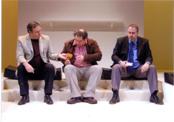



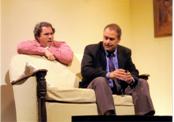
| Review: | By Derrick Graham |
But as the play progressed and there was no attempt at humour, it became evident that the 3 characters, Marc, Serge and Yvan were deadly serious about this ridiculous three foot by five foot white painting that Serge had bought. His belief was that, as it was by Anteos, a rising young artist whose work would soon be "collectible", it must be worth the money. A rather true observation, as it could be no more ridiculous than works in the Modern Tate, with prizes for a pile of bricks or an unmade bed. Contemporary art is what is perceived by the onlooker.
Serge, a dermatologist, played by Jerry Phillips, was wonderfully convincing in his belief that this white canvas was a masterpiece and that as one looked at it there was a scene portrayed. His friend of 15 years, Marc, came over as a stronger character by Mark Pendrey, sure that Serge had been conned and quarrels bitterly with him over his stupidity in spending all his savings. The acting was brilliant as these two men argued, ultimately coming to blows, but stopping when Yvan, in trying to get between them, takes a punch to the head and gets knocked down.
Mike Strong came over perfectly as the easy going Yvan, agreeing with both sides, but in dire trouble over the list of guests for his forthcoming wedding, juggling with two stepmothers, birth parents and fathers who want to be present, but not if their ex-wives are there.
Finally Marc and Serge resolve their quarrel by Marc drawing a skier on a mountain on the white canvas with felt tip pen to show what he sees in the picture. Honour satisfied, Serge cleans it off (having first made sure the ink is water soluble) and rehangs the picture.
The room was a wonderfully stark setting in black and white, perfect for the display of the canvas.
| 14–16th September 2006 |
By Monaghan, Petterle & Heimann Directed by Lauren Milsom |
In the anteroom of the afterlife you must choose one memory from your life; all others will be erased and you'll live that one for eternity, over and over again. Think quickly – you have to the count of 100 to choose. "Fascinating" – The Guardian. "Moved me more profoundly than anything I can remember " – Scotsman.
| Cast | Crew | |||
| Guide | Tom Milsom | Technical Designer | Graham House | |
| Alex | Denholm Spurr | Visual Effects | Jonathan Laverock | |
| Ketu | Harry van Manen | Co-ordinator | ||
| Sophie | Katherine Sparshatt | Stage Construction | Nick Gane | |
| Lisa | Alex Farquharson | Stage Manager | Fred Bradley | |
| Nia | Sarah Macdonald | Sound | Lizzie Fitzwater | |
| French | Lighting | Rhian Hayes | ||
| commentator, | Props | Clare Sparshatt & | ||
| Hunter 1 | Kerry-Ann Radburn | |||
| & Gavin | Oliver Robinson | Wardrobe | Jo Hopkins & | |
| Gomez, | Josie Searle | |||
| Photographer | Original drawings | Tom Milsom | ||
| & Pilot | Alexander Clark | Production Secretary | Vicky van Manen | |
| Sophie’s mother | Daisy Marsh | |||
| Jerry | ||||
| & Ketu’s son | Mitchell Baldock | |||
| Phil | ||||
| & Hunter 2 | Max Mayhew | |||
| Lucy | Siân Hayes | |||
| Tube train | ||||
| announcer |
||||
| & Ketu’s son 2 | Ben Perry | |||
| Ketu’s wife | Lucy Bennett | |||
| Stewardess | ||||
| & Doctor | Suzie Fitzwater | |||
| Lisa’s mother | Grace Hopkins | |||
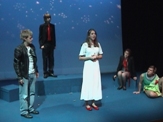
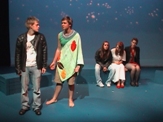

| Review: | By Derrick Graham of the Surrey Mirror |
The play 100 has the premise that on the way to the afterlife there is a checkpoint, where in the time it takes to count one hundred (very slowly it must be said), we choose the memory we would wish to preserve for all time.
But what if you couldn't choose? That is the surprising twist at the end of this play, first seen at the Edinburgh Festival and now staged by the Chipstead Junior Players at the Courtyard Theatre.
The acting was very polished, directed by Lauren Milsom, who also extended the play to include another character. Eleven players had supporting roles as the principals recalled their lives in act one and their deaths in act two.
Their guide was played by Tom Milsom, not an angel in a dark suit, but a spirit who couldn't select a memory and was stranded in limbo. He maintained his position of control and authority as he urged the new arrivals to decide on what memory to take with them.
Alex (Denholm Spurr) had been a keen motorcyclist and had a wonderful fantasy memory of winning a great race, played out on the stage with crowds and noise and his girlfriend Nia on the pillion behind him.
Sarah Macdonald in this role was brilliant – wonderful facial expressions, great body language and her finest memory to take to eternity was when Alex said he loved her. It was also her last memory, as at that point they died in a fire in a hotel.
Lisa's best memory is her flight in an aircraft with a film director and the lifestyle of glamour and money. Super mime and an excellent air hostess by Suzie Fitzwater, but the happiness was destroyed as Lisa remembers her subsequent disappointments. The memory she wishes to take is of her mother (Grace Hopkins) being with her as she dies having a baby. A moving performance by Alex Farquharson.
It was a sad death too for Ketu (Harry van Manen) who hangs himself after being rejected by his tribe for insisting that the world is round.

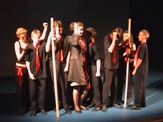
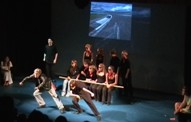
All have gone but Alex and the guide – the fantasy of winning the motorcycle race wasn´t a true memory. The hundred count runs out and Alex is stranded in limbo and then the guide vanishes and a new one appears to welcome the next group on their way to eternity. It is Alex, no longer in his leathers but now in a dark suit.
| Review: | By Peter van Manen |
The plot of "100" is wonderfully simple. One memory to hold for all eternity after you die. The problem: you choose it or you lose it. We knew that we were in for something special when the handful of actors came onto a bare stage and instantly filled the air with tension and uncertainty. No props. No fancy costumes. No sophisticated special effects. Just acting.
Tom Milsom was convincing as the Guide with the right balance of authority, cockiness and suppressed anxiety. He set the tone for the others and built up the urgency of their predicament as the story unfolded. Denholm Spurr captured beautifully the bravado, cynicism and increasing uncertainty of Alex. His interaction and wordplay with the others, particularly the Guide, Nia and Ketu, helped give the play its edge and richness. Sarah McDonald has wonderful stage presence which she used to great effect as the girlfriend, Nia. Hers was a fresh and mature performance that gave the audience some feeling of hope as the darkness descended upon the others. Harry van Manen played the part of Ketu to perfection, capturing his primitive excitement and enthusiasm, but without falling into caricature. His was a very moving performance at times which kept us, the audience, both engaged and on edge. Alex Farquharson was very good as Lisa, gently developing and adding complexity to the character as her story unfolded. Alex is another actor with terrific stage presence and she used this to great effect in this role. Katherine Sparshatt played the part of Sophie and she was sublime. She grabbed the audience by the scruff of the neck and just wouldn’t let go. She shook us, she roughed us up and she made us cry. It was a stunning performance.
But there was more. The other members of the company flowed seamlessly on and off the stage for the wonderful memory sequences. The motorbike race was exciting. Mother´s bedroom scene was sad. The executive jet was funny. The meeting in the park was fun. Canoeing through the jungle and traveling on the underground was clever. Amnesia on the streets of London was haunting. The actors brought the stage to life with the simplest of costumes and props, weaving a rich tapestry before our very eyes.
But great plays like this don’t just happen. It was beautifully directed and choreographed by Lauren Milsom, who was ably assisted by Grace Hopkins. Lauren filled the stage with her actors, while skillfully directing the attention of her audience to the action and dialogue that really mattered. She made it so easy for us to sit back and enjoy the story and the fine individual and ensemble performances.
"100" is going to be a hard act to follow.
| 17th – 22nd July 2006 |
By George Farquhar Directed by Margaret Hunter |
Farquhar’s last play revolves around the efforts of "two gentlemen of broken fortune" to marry money. It offers a delicious taste of adultery – justifying the weakness of women and the enterprise of their seducers – plus the usual Restoration comedy byplay of comely serving girls, bold highwaymen and a French count.
| Cast | Crew | |||
| Aimwell | Michael Strong | Set Designer | Graham House | |
| Archer | Jeremy Nicolls | Stage Manager | David Franks | |
| Dorinda | Alex Giles | Set Construction | Chipstead Players crew | |
| Mrs Sullen | Lauren Milsom | Wardrobe | Rosalyn Hayes, | |
| Lady Bountiful | Julie Cumbo | Pat Andrews, | ||
| Count Bellair | Alex Greenslade | Audrey Simpson, | ||
| Sullen | Jon Laws | Eileen Gibbs | ||
| Cherry | Grace Hopkins | Composer | Mark Slater | |
| Sir Charles | Charlie | Recordist | Rod Lucas | |
| Freeman | Crowther-Smith | |||
| Foigard | Colin Edgerton | |||
| Gibbet | Philip Laughton | |||
| Gipsy | Sharon Radburn | |||
| Hounslow | Nick Gane | |||
| Bagshot | Denholm Spurr | |||
| Boniface | Ian Radburn | |||
| Scrub | Don Hindle | |||
| Country | ||||
| Woman | Margaret Ramsdale | |||
| Fellow/Tapster | Denholm Spurr | |||

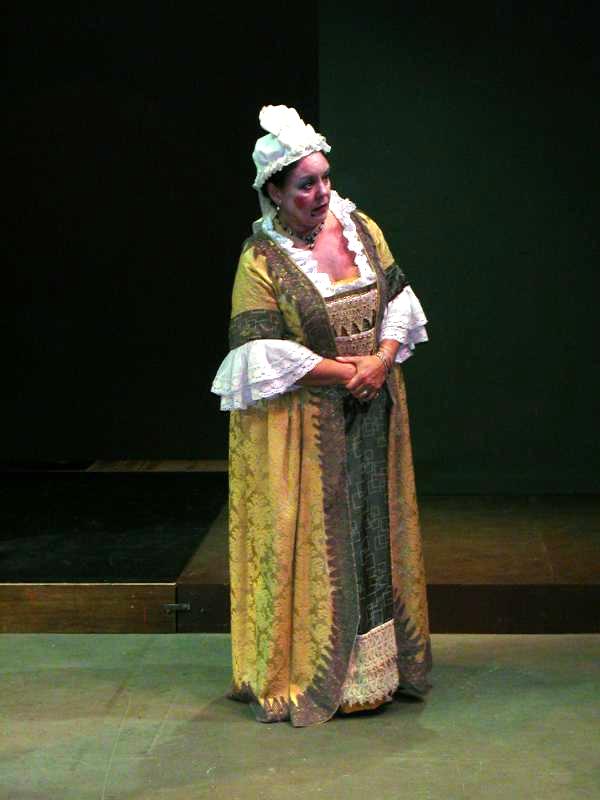
| Review: | By Derrick Graham of the Surrey Mirror |
One such was Beaux Stratagem, plenty of loose morals and seduction and a wonderful production by the Chipstead Players. Nine Junior Members of the Players, in period costumes and masked, danced on and around and moved the props to change the settings, so smoothly that the changes were hardly noticed.
The plot is that two gentlemen alternate between being master and servant, visiting various villages. There they strike up a friendship with wealthy families, seduce the daughters and wives and relieve them of their jewels and money before disappearing.
Aimwell, a wonderful performance by Michael Strong, has a brother who is a Knight and when needing to impress, uses his brother’s name. Archer is also obviously gentry, but having fallen on hard times now works as a servant to Aimwell. Jeremy Nicolls made this a fine characterisation, having to show deference in public but the opposite when they were alone.
Ian Radburn’s innkeeper was coarse and overbearing, with a beautiful daughter Cherry, played by Grace Hopkins. Lovely flirtacious acting, but we tended to lose her words when she turned upstage. The Tapster was played by Denholm Spur.
Lady Bountiful was a plump gentlewoman, renown for her skills with herbal remedies, whose husband does not appear. Julia Cumbo got this cameo part off to perfection. Her brutish son also lives in the house and Jon Laws, playing the part, got over well the uncouthness, but his bright ginger wig seemed to have got out of control and tended to distract.

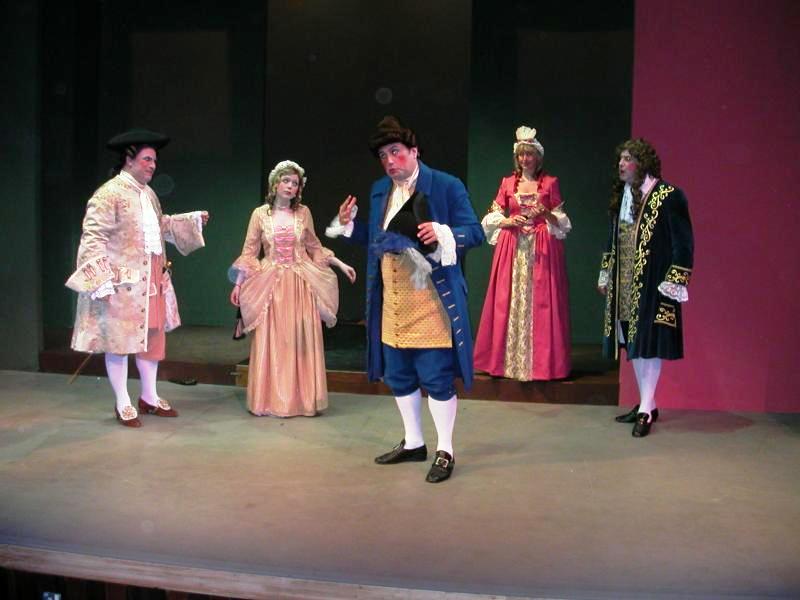
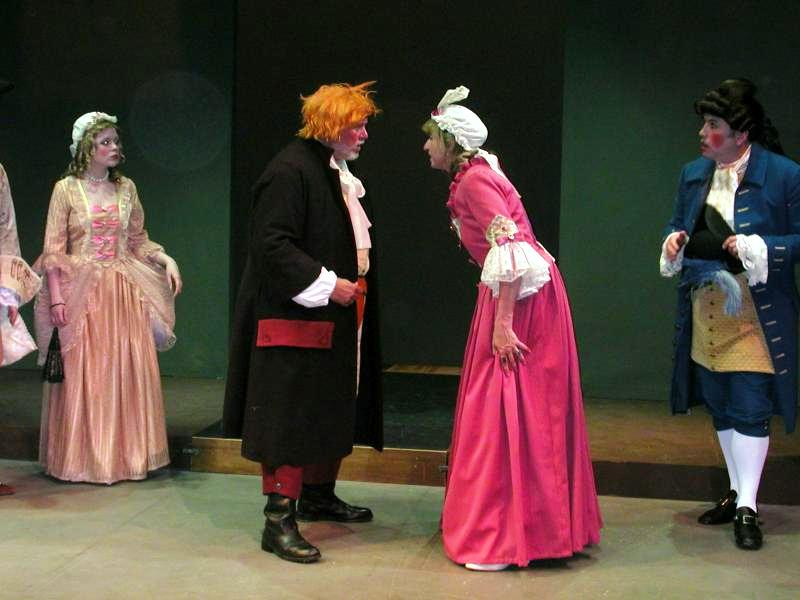
There was a French prisoner also in the house also trying his luck with the ladies, played by Alex Greenslade with an appalling accent. Sir Charles Freeman, a very elegant Charlie Crowther-Smith, an old friend of Archer’s arrives and informs Aimwell that he no longer needs to pretend to be titled as his brother has died and he now has the title. Weddings can now be arranged as the Priest (Colin Edgerton) is at hand.
It was a wonderful production. Margaret Hunter, the Director, is a master at costume drama and the manners and styles of the period showed perfection in research and acting.
| 29th May – 3rd June 2006 |
By Ray Cooney Directed by Val Young |
| Cast | Crew | |||
| Richard | Charlie Crowther-Smith | Set Designer | Ken Nicholson | |
| Manager | Warwick Beazley | Stage Manager | Graham House | |
| Jane | Lesley Parker | Set Construction | David Workman and the | |
| A Body | Don Hindle | Chipstead Players crew | ||
| Waiter | Paul Brown | Wardrobe | Margaret Ramsdale | |
| George | Mel Morgan | Bridget Band | ||
| Maid | Rosalind Heath | |||
| Ronnie | Ian Radburn | |||
| Pamela | Anne-Marie Carlile | |||
| Gladys | Maggie Taverner | |||
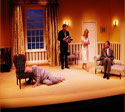
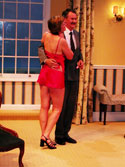

| Review: | By Derrick Graham of the Surrey Mirror |
Ray Cooney, as do many other playwrights, polishes and rewrites as necessary during the try-out stage of a play, but unusually, as a brilliant comedy actor, he also takes a leading role to get the “feel” of the audience.
The comedy character in the play, now re-named “Out of Order”, is George Pigden, the hapless PPS to Richard Willey MP. Cooney polished this part to perfection before handing it over to another actor for the West End run. In the production at the Courtyard Theatre, The Chipstead Players were fortunate to be able to cast Mel Morgan as George, who then gave a performance worthy of comparison with its originator. Every expression of horror and despair as Willey diverts blame for his own problems onto his PPS, were brilliantly portrayed.
Charlie Crowther-Smith made Willey a perfectly ruthless politician, intent only on having his night of passion with Jane, the secretary, but having to cover his tracks when a dead body is discovered part way through the window of the hotel room (the closed curtains having previously concealed it).
The essence of farce is perfection in timing, as one person leaves the room another is coming in, but they don´t see each other. Here we had a sliding sash window that dropped with enough force to break an actor´s neck as they climbed in and out, but they got through just in time. But not always and in the course of the play several of the cast had the terrifying experience of knowing the heavy sash would fall, but stop a fraction above their neck, yet realistically enough to appear they had been knocked out. Graham House, the Stage Manager, must be congratulated on perfect control of the drop mechanism.
Margaret Thatcher demands that Willey returns to the House immediately, to lend support for the Bill under debate, and whilst he is away the situation rapidly gets worse. Paul Brown as the Waiter was always on hand to assist with anything needed to get rid of the body, given a suitable bribe. Rosalind Heath was the Spanish maid brought in to confuse the plot still further as another wife for George.
Val Young made a great job of directing, keeping the cast up to speed so that the farce never faltered. A very realistic set made this production another Chipstead Players brilliant success.
| 20th – 22nd April 2006 |
By Jennifer Toksvig and David Perkins Directed by Lesley Parker |
Welcome to ancient Greece on the day set for the wedding of Pandora – until she opens THAT BOX and disappears. The gods, goddesses, nymphs and mortals hunt her out in a fast-paced "mythadventure".
| 27th February – 4th March 2006 |
By Ted Tally (Hooters, Silver Lining) Directed by Maggie May |
| Cast | Crew | |||
| Scott | David Kay | Set Designer | Alan Croft | |
| Amundsen | Lawrence Marsh | Stage Manager | Nick Gane | |
| Wilson | Jeremy Taylor | Set Construction | Chris Catley and | |
| Oates | Paul Valleau | Philip Laughton | ||
| Evans | Brian Jerome | Wardrobe | Liz Lockhart-Mure | |
| Bowers | Chris Butler | |||
| Kathleen | Sarah Fordham | |||




| Review: | By Derrick Graham of the Surrey Mirror |
In this particular play, which tells the harrowing story of Scott of the Antarctic, five men set out in 1911 to walk to the South Pole pulling a sledge with all their supplies, tent and survey equipment. They were from the Royal Navy, Marines and Army with Dr. Wilson, a surgeon, and led by Captain Scott of the Royal Navy.
They got to the pole only to find that a Norwegian, Amundsen, had got there first, using dogs to pull his sledge, killing them as needed on the way back to provide food and thus able to travel lighter. All of Scott’s team died on the way back from the pole and the only record of what happened was his journal discovered later.
The ship they set out on was the Terra Nova and this was used as a title of a play by Ted Tally, performed by the Chipstead Players at the Courtyard Theatre. With only the skeleton of the story of the expedition, the author had to create a fictional account of what went on using flashbacks, ghosts of those who died and imaginary visits by Amundsen.
It was brilliantly acted, the setting was superb – with white sheeting on walls and floor – and there were some wonderfully authentic props. The sledge appeared to be a museum relic, but was, in fact, built backstage, and the clothing was very convincing, including fur boots and gloves.
David Kay was excellent as Scott, a commander determined that the British would get there first and then gradually realising that Amundsen, by using his dogs as food, was better organised. Not very British to slaughter man’s best friend for the sake of travelling lighter and faster. Lawrence Marsh as Amundsen had just enough accent to bring the part to life and got over very well the superiority of his position.
In various flashbacks, Scott’s wife Kathleen appeared, showing how they first met, when she sculptured him and, later, when their son Peter was born. A very convincing performance, beautifully costumed.
Chris Butler as Bowers, Jeremy Taylor as Wilson the Surgeon, Paul Valleau as Oates and Brian Jerome as Evans were all magnificent in the parts they played. Evans has gangrene and, realising that he cannot walk and keep up, takes off his warm clothing to die in the 40-degrees-below-freezing snow. Oates, who has lost his toes from frostbite and has gangrene, leaves the tent and walks away to die. With Bowers snow-blind and not enough food to get them back to base, the play ends with the three men waiting to die, as the ghosts of the others come to meet them.
A wonderful slide show of scenes from Antarctica opened each act and the production was a great tribute to the director Maggie May.
| 4th – 8th & 11th – 14th January 2006 |
By Charles Dickens, adapted by John Mortimer Directed by Yasmin Leighton |
| Cast | Crew | |||
| Scrooge | Phillip Laughton | Set Design | Linda Hornzee-Jones | |
| Set Construction | John Fitzwater and the Chipstead | |||
| Players Construction Crew | ||||
| With Members of the Senior | Wardrobe | Pam Jarrad and assistants | ||
| and Junior Players | Stage Management | Mel Morgan and assistants | ||

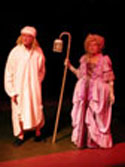
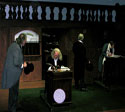
| Review: | By Derrick Graham of the Surrey Mirror |
Visualise the top of a vast writing desk that filled the stage. Each side were sloping panels notched out to form staircases and at the top a railed gallery. The vertical back of the inside of the desk, about eight feet high, was divided up into drawers and cupboards and the horizontal writing surface in the centre – the main stage area – simulated to look like green leather. Some of the " cupboards" when opened provided access, others when folded back revealed settings with inside of the cupboard doors fitted out to complete the setting. One large panel hinged down to form Scrooge’s bed, others opened to form part of his office and the smouldering fire for which Bob Cratchit unsuccessfully begged coal. Pedestal desks were rolled in from side cupboards and faint light came through a musty window.
Sadly the programme did not come up to the high standard of the production. Only Philip Laughton was named for his part of Scrooge, the other 14 principals were listed by name but not the roles they played. Similarly with the 27 members of the Junior Players involved. In a gloomy narrow corner of the theatre entrance foyer there was a list of who played what, written faintly on black paper, but as this was the most crowded part of the theatre it was not possible to stop and study it.
Needless to say they were all absolutely brilliant, with Mr Fezziwig exceptionally so. Great cameo parts from the two actresses who were Scrooge’s cleaners and brought his bed linen and clothes to a dealer after Scrooge's "death" in the Christmas Yet To Come. The Ghosts were wonderful, that of Christmas Past being played by Cynthia Coatts who celebrated her 90th birthday during the run of the play. What should have been a terrifying scene, played in the deep gloom of the bedroom, was spoilt however, by two of the street urchins, brightly lit, leaning over the rail above it. They watched as Scrooge undressed, put on his nightshirt and got into bed and the arrival of a frightful figure of Marley's ghost appeared, chained to three demons, all without reaction from the boys. Only later did one of them say a line to link the story and then they went off.
There was a superb choice of music providing links and background, wonderful period costumes, and perfection in direction by Yasmine Leighton.
| Review: | By Diana Eccleston of the Croydon Advertiser |
The whole is greater than the individuals involved, since it is not really the quality of the acting which offers the greatest enjoyment. The set, designed by Linda Hornzee-Jones, is ingenious with its drop-down bed and doors which fold back to reveal house interiors. Costumes, organised by Pan Jarrad and her team, are first class. And the Christmassy music is an added bonus.
The story of skinflint Scrooge’s journey with the spirits to discover the error of his ways and become a reformed character is, of course, one of the greatest in English literature. But this version does drag on a bit, with a slow burning fuse to start with. At least one scene could be dispensed with (the street skating one) since it adds nothing to the plot and there are several sluggish patches.
The major one on opening night came when Ebenezer realises he is alive, it is Christmas Day and he has time to make amends to all those he has wronged. This is a time for impulsive jubilation when he is falling over himself with excitement to fulfil all his new and generous plans. Phillip Laughton took the pace far too ponderously. Did we really have to watch him getting dressed so slowly? Despite a tendency to lack of pace throughout he does create a realistically tetchy old humbug.
The rest of the characters are not itemised in the programme since most people take multiple roles. Rick Thompsett stands out as the benign Mr Fezziwig and Barbara Richardson, who plays his wife, shines as the old girl who Scrooge sees flogging off his belongings when he is given a glimpse of what the future holds.
Cynthia Coatts is the dignified Bo-Peep-like Spirit of Christmas Past and Peter van Manen an impressive looking Spirit of Christmas Present with sweeping green fur-trimmed cloak and holly wreath crown. He has a jovial laugh, though unfortunately it gives him a rather drunken demeanour.
It may be on the lengthy side (you could almost read the book in the time it takes to tell the story on stage here) but it is great to see old Scrooge looking so well.